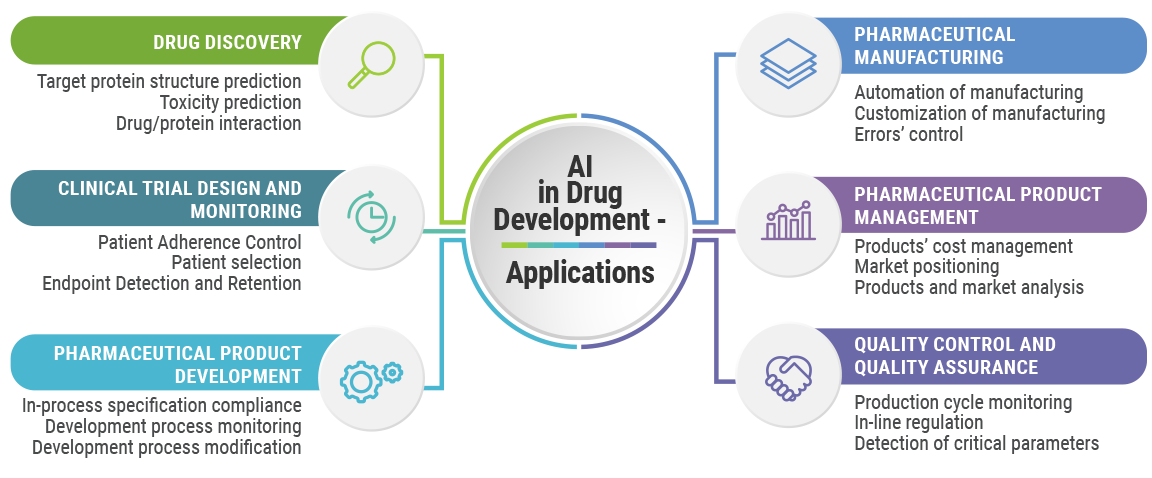Artificial Intelligence (AI) is revolutionizing the pharmaceutical industry, especially in the realm of drug development. This transformation is opening up new frontiers in healthcare, making the process of developing new medicines faster, more efficient, and significantly less expensive.
This article delves into the various ways AI is contributing to advancements in drug development, simplifying complex processes, and promising a future where treatments for diseases could be discovered with unprecedented speed.
1. Speeding Up Drug Discovery
Traditionally, discovering a new drug is a long, costly affair, often taking over a decade and billions of dollars. AI is changing this scenario by significantly speeding up the drug discovery process. AI algorithms can analyze vast amounts of data on existing medicines and biological processes to predict how new drugs can interact with targets in the body.
This ability to rapidly screen thousands of potential drug candidates can reduce the time from discovery to clinical trials, cutting down years of research and saving a considerable amount of resources.
2. Enhancing Precision and Personalization
One of the most promising aspects of AI in drug development is its role in personalized medicine. By leveraging data from genetic tests and patient records, AI models can identify patterns that might not be obvious to human researchers. This capability allows for the development of drugs tailored to the genetic makeup of individual patients, enhancing the effectiveness of treatments and minimizing side effects.
Personalized medicine represents a shift from a one-size-fits-all approach to healthcare towards a more tailored strategy, promising better outcomes for patients.
3. Reducing Failure Rates
Drug development is fraught with high failure rates, with many compounds failing to make it past clinical trials. AI can mitigate this risk by predicting the success of drug candidates much earlier in the development process. Through the analysis of historical data on clinical trials, AI models can identify potential issues with drug compounds, such as toxicity or inefficacy, before significant resources are invested in them. This predictive capability not only saves time and money but also reduces the risk of failure in later stages of development.
4. Facilitating Drug Repurposing
Drug repurposing involves finding new uses for existing drugs, and AI is playing a crucial role in identifying these new applications. By analyzing extensive databases of drugs and diseases, AI algorithms can uncover hidden relationships between drug compounds and medical conditions. This approach has been particularly useful in responding to emerging health crises, such as the COVID-19 pandemic, where AI helped identify existing drugs that could be repurposed to treat the virus.
Drug repurposing can bring new treatments to patients more quickly and at a lower cost than developing a new drug from scratch.
5. Improving Clinical Trials
AI is also transforming the way clinical trials are conducted. By analyzing patient data, AI can help identify the most suitable candidates for trials, ensuring that the trials are more efficient and have a higher chance of success. Furthermore, AI can monitor trial data in real time to identify adverse effects or success indicators, allowing researchers to make quicker adjustments. This not only speeds up the trial process but also enhances the safety and efficacy of new drugs.
Conclusion
The integration of AI into drug development is a game-changer for the pharmaceutical industry and healthcare as a whole. By speeding up the drug discovery process, enhancing the precision of treatments, reducing failure rates, facilitating drug repurposing, and improving clinical trials, AI is paving the way for more efficient, cost-effective, and personalized healthcare solutions. While challenges remain, particularly in terms of data privacy, regulatory compliance, and ensuring the reliability of AI predictions, the potential benefits of AI in drug development are immense.
As technology continues to advance, we can expect AI to play an increasingly central role in bringing new, life-saving drugs to market with greater speed and efficiency. The future of drug development, powered by AI, holds the promise of transforming our approach to treating diseases and improving patient outcomes worldwide.
